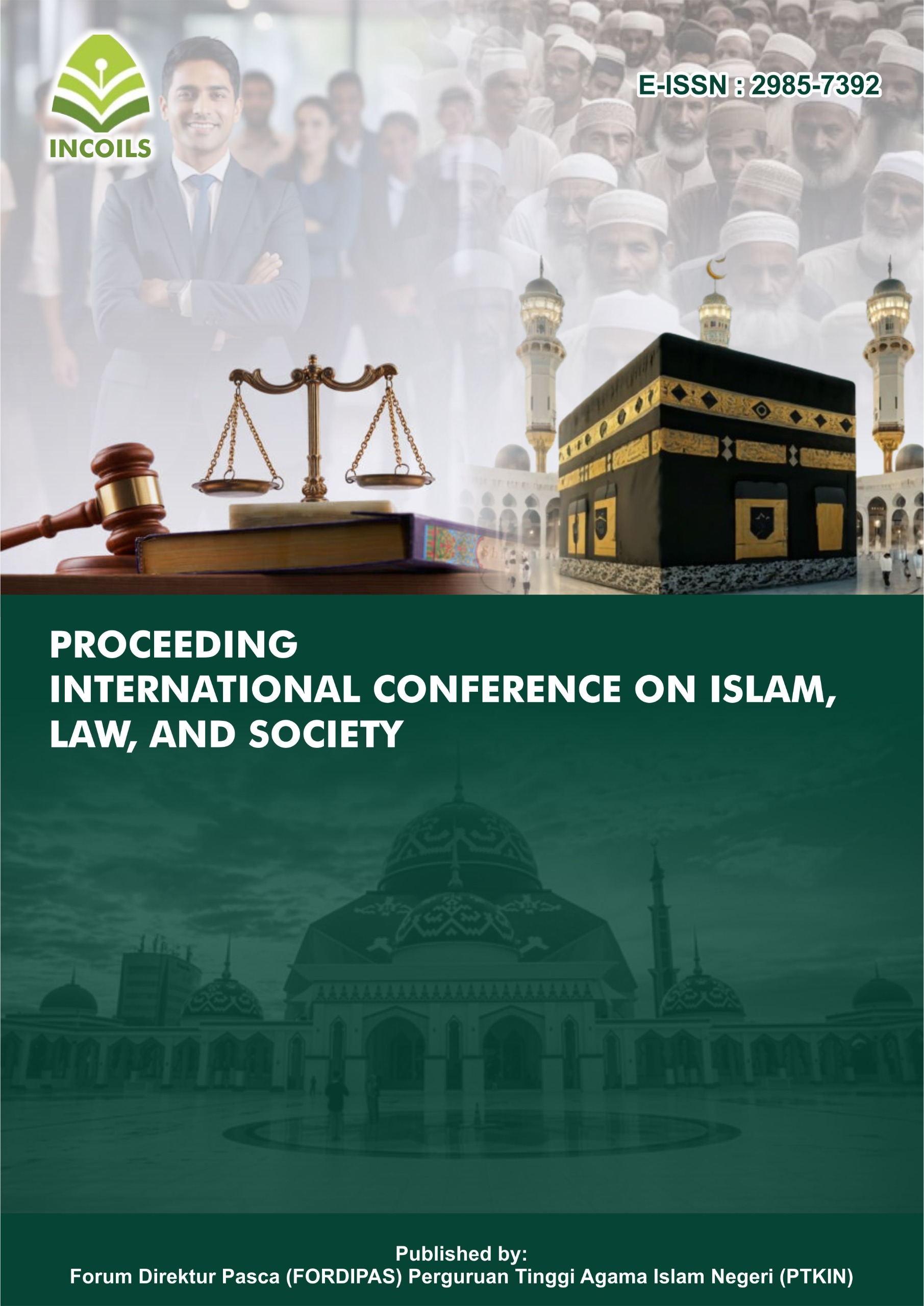Getting to Know Ahl al-Sunnah wa al-Jema'ah in Context Nahdlatul Wathan
DOI:
https://doi.org/10.70062/incoils.v2i1.76Keywords:
Knowing, Ahl al-Sunnah wa al-Jamaah, Context, Nahdlatul WathanAbstract
The social development of Muslims in Nahdlatul Wathan (NW) in the aspects of theology, shari'ah (fiqh), and Gnosticism (mysticism/tasawuf) is inseparable from the internal (scientific) and external (experience) dynamics and dialectics of its founder, TGKH. Muhammad Zainuddin Abdul Madjid so that scientific discourse is needed to understand the history, substance, and existence of doctrines in Nahdlatul Wathan as an effort to affirm, reconstruct and the dialectic of Nahdlatul Wathan in the understanding of Ahl al-Sunnah wa al-Jama'ah. This article is a response to this discourse in filling the literature and scientific treasures, especially among the generation of Muslims who are not very familiar with the teachings of Ahl al-Sunnah wa al-Jama'ah. The understanding of Ahl al-Sunnah wa al-Jama'ah in the historical context or its birth background, when it was first introduced by its two great figures (Imam al-Asy'ari and Imam al-Maturidi) and brought to the surface, is important to know together, especially the understanding of Ahl al-Sunnah wa al-Jama'ah in the context of aqidah, Nahdlatul Wathan through its founders has determined to be oriented towards the aqidah formula formatted by Imam al-Asy'ari. In this paper, the author uses a multi-literacy comparative approach to understand the format and dialectical model of the Ahl al-Sunnah wa al-Jama'ah understanding in the context of aqidah in general, while to understanding Nahdlatul Wathan in the dialectical understanding of Ahl al-Sunnah wa al- Jama'ah in this case, the author uses a special literacy approach, namely the Testament of Reflections on New Experiences (written by the founder of Nahdlatul Wathan). These two persuasive steps are characteristic of this paper which distinguishes it from related writings.
References
A Hanafi, Pengantar Teologi Islam , Jakarta: Pustaka al-Husna Baru: 2003.
Abdul al-Qahir bin Thahir bin Muhammad al-Bagdadi, al-Farq baina al-Firaq, Mesir: al-Azhar, 1037.
Abdul Hayyi Nu’man, Mazhab Ahlussunnah Wal-Jama’ah Anutan Organisasi Nahdlatul Wathan, Lombok Timur: Pengurus Besar Nahdlatul Wathan, 2011.
Abdul Rozak dan Rosihon Anwar, Ilmu Kalam: Untuk UIN, STAIN, PTAIS,, Bandung: CV Pustaka Setia, 2006.
Abdur Rahman Manaf, Kitabus Sa’adah Fit Tauhidil Ilahiyah. Terj, Abdul Hayyi Nu’man, Anjani: Pengurus Besar Nahdlatu Wathan, 2001.
Abi al-Fath Muhammad Abd al-Karim bin Abi Baskar Ahmad Asy-Syahrastani, al-Mihal wa al-Nihal, Libanon, Beirut: Dar al-Fikr, tt.
Ahmad Amir Azis, Pola Dakwah TGKH Muhammad Zainuddin Abdul Madjid 1989-1997, Mataram: Larispa, 2011.
al-Asy’ari, Abu Hasan Ali ibn Ismail, al-Ibanah ‘an Usul al-Diyanah, Bairut: Dar al-Kitab al-‘Arabi, 1985.
al-Asy’ari, Abu Hasan Ali ibn Ismail, Maqalat al-Islam iyyin wa Ikhtilaf al-Musallin, al-Qahirah: Maktabat al-Nahdah al-Misriyyah, 1950.
Ali Musthafa Al-Ghurabi, Tarikh Al-Firaq Al-Islam iyah, Kairo, 1958.
Aziz Dahlan, Sejarah Pemikiran Perkembangan Dalam Islam , Jakarta: Beunneubi Cipta1987.
Baharuddin, Nahdlatul Wathan dan Perubahan Sosial, Yogyakarta: Genta Press, 2007.
Cyril Glasse, The Concise Encyclopedia Of Islam , London: Staccny International, 1989.
Departemen Agama RI. Ensiklopedi Islam ,1990.hlm.633-6:Ahmad Amin, Fajrul Islam . Jilid I. Islam . Ej Srill,Leiden, 1961.
Hanafi Ahmad, Teologi Islam : Ilmu Kalam, Jakarta: Bulan Bintang, 2001.
Harun Nasition, Teologi Islam : Aliran-Aliran Sejarah Analisa Perbandingan, Jakarta: UI Press, 1986.
Ibnu Katsir, al-Bidayah wa al-Nihayah, juz VII et.I., Beirut: Dar al-Fikr, 1996.
Imam Syafi’i, al-Risalah. terj. Ahmadie Thoha, Jakarta: Pustaka Firdaus, 2004.
Jajat Burhanuddin & Ahmad Baedowi, Transformasi Otoritas Keagamaan, Jakarta: Gramedia Pustaka Utama, 2003.
Luwis Ma’luf, al-Mufid al-Lughah wa al-Alam, Beirut: Dar al-Masyriq, 1998.
Martin Van Bruinessen, Kitab Kuning, Pesantren dan Tarekat: Tradisi-Tradisi Islam di Indonesia, Bandung: Mizan, 1995.
Mohammad Noor, Muslihan Habib, dan Muhammad Harfin Zuhdi, Visi Kabangsaan Religius: Refleksi Pemikiran dan Perjuangan Tuan Guru Kyai Haji Muhammad Zainuddin Abdul Madjid 1904-1997 (Jakarta: PT. Logos Wacana Ilmu, 2004.
Muhammad Imrah, Tarayat al-Fikr al-Kalam. Juz 2, (Alexanderia: Muassasah al-Tsaqafah al-Jami’iyah, 1992.
Muhammad Nasihuddin B, Meniti Tapak Sejarah 66 Tahun Pondok Pesantren Darunnahdlatain Nahdlatul Wathan Pancor, Pancor: YPD PPD NW, 2001.
Muhammad Tholhah Hasan, Aswaja Dalam Persepsi dan Tradisi NW, Jakarta: Lantabora Press, 2005.
Nurul Mukhlishin Asyrafuddin, Mukhtashar Aqidah wa Manhaj al-Imam al-Syafi’i, Markaz Abu Salma, 2007.
Sahilun A. Nasir, Pemikiran Kalam: Teologi Islam , Jakarta: Rajawali Pers, 2010.
Sayyid Abdussalam bin Alwi Hinduan, Sejarah & I’tiqad Ahlussunnah Waljama’ah serta Penyebarannya di Indonesia edisi revisi, kupang: Assawi Publishing: 2013.
Seyyed Hossen Nasr dan Oliver Leaman, Editor, Ensiklopedi Tematis Filsafat Islam . terj. Histori of Islam ic Philosophy, Mizan, Bandung: Mizan, 2003.
Syafieh, Konsep al-Kasb al-Asy’ari dan Modernisasi Dalam Islam .
Syahrastani, al-Milal wa An-Nihal, Beirut: al-Dar al-Fikr, tt.
Syaikh Ismail Usman Zain al-Makki, Irsyadul Mu’min ila Fadla’ili Zikri Rabbil ‘Alamin. Terj. Abdul Hayyi Nu’man, Pancor: Pengurus Daerah NW Lombok Timur, 1996.
TGKH. Muhammad Zainuddin Abdul Madjid, Wasiat Renungan Masa Pengalaman Baru.
Tim Departemen Agama, Tim FISIP UT, Materi Pokok Pendidikan Agama Islam ,, Jakarta: Universitas Terbuka, 2004.
Ulyan Nasri, Menziarahi Filsafat: Sebuah Pengantar Filsafat Umum, Yogyakarta: Semesta Ilmu, 2015.
W. Montgomery Watt. Islam ic Philosophy and Theology: An Extended Survey, Eidenburgh: At Univ, Press, 1987.
Downloads
Published
How to Cite
Issue
Section
License

This work is licensed under a Creative Commons Attribution-ShareAlike 4.0 International License.







